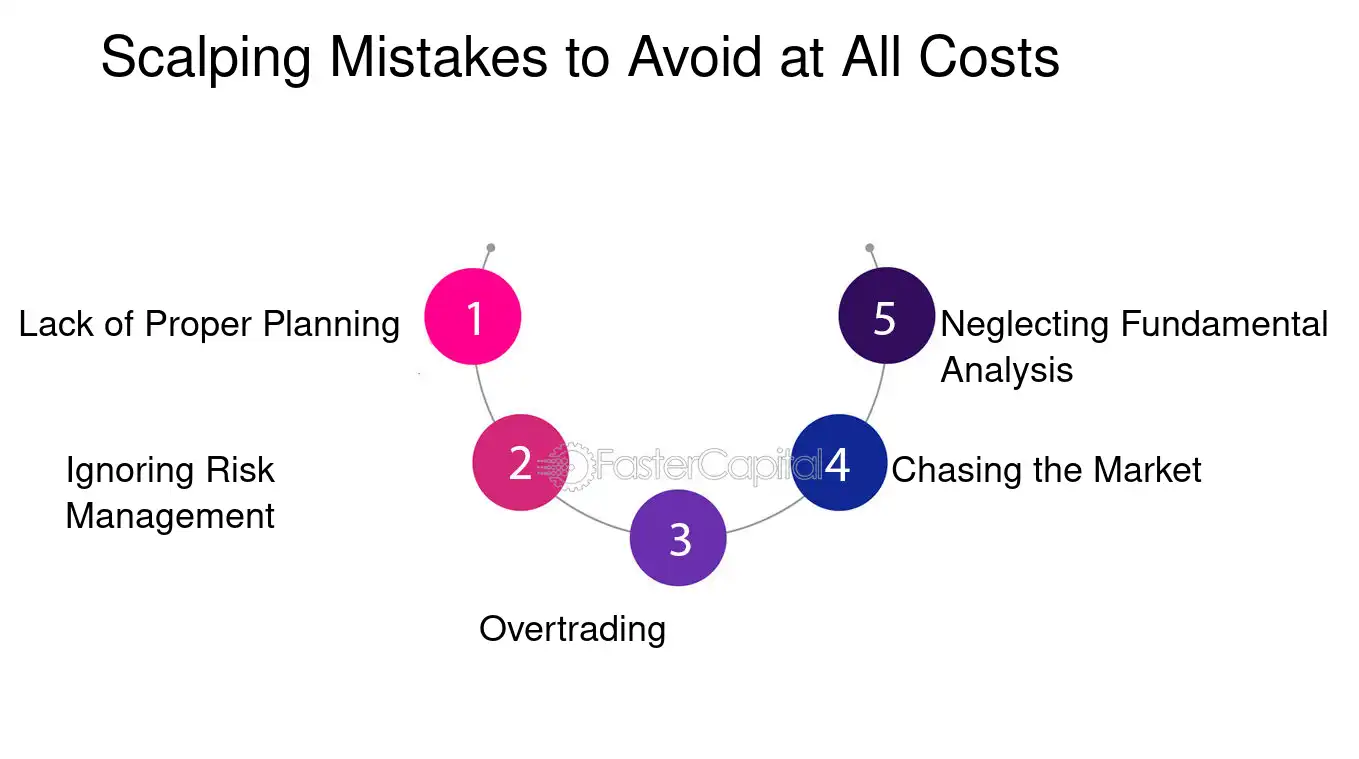Did you know that some traders think "scalping" is just a fancy term for a bad haircut? In reality, it’s a fast-paced trading strategy that can yield significant profits—if done right. In this article, we’ll dissect the common mistakes that day traders make while scalping, from improper risk management and overtrading to the pitfalls of emotional trading and poor planning. We’ll cover the importance of choosing the right broker, the dangers of neglecting market research, and how to avoid costly errors related to high commissions and market volatility. Plus, we’ll share effective strategies to set realistic profit targets and prevent burnout. With insights from DayTradingBusiness, you’ll be better equipped to refine your scalping approach and enhance your trading success.
What are the most common mistakes in day trading scalping?
1. Overtrading: Taking too many trades can lead to losses. Stick to a clear strategy and set a maximum number of trades per day.
2. Ignoring Risk Management: Failing to set stop-loss orders increases the risk of significant losses. Always define your risk before entering a trade.
3. Lack of Discipline: Chasing losses or deviating from your strategy can be detrimental. Stay disciplined and follow your plan.
4. Poor Execution Timing: Entering or exiting trades too late can reduce profits. Use limit orders to control your entry and exit points more effectively.
5. Emotional Trading: Letting emotions drive decisions can lead to mistakes. Keep a level head and stick to your trading rules.
6. Neglecting Market Conditions: Not considering market volatility or news events can affect your trades. Always stay informed about factors that could impact price movements.
7. Inadequate Research: Skipping analysis of stocks or assets can lead to uninformed decisions. Conduct thorough research before trading.
8. Ignoring Transaction Costs: High-frequency trading can incur significant fees. Factor in commissions and spreads when calculating potential profits.
9. Underestimating Time Commitment: Scalping requires constant attention to the market. Ensure you can dedicate the necessary time to monitor trades effectively.
10. Using Too Much Leverage: High leverage can amplify losses. Use leverage wisely and know your limits.
How can improper risk management affect my scalping strategy?
Improper risk management can severely impact your scalping strategy by increasing losses and reducing profit potential. Without setting strict stop-loss orders, you might hold onto losing trades too long, leading to significant drawdowns. Failing to size your positions correctly can expose your capital to unnecessary risk, making it harder to recover from a single bad trade. Additionally, not diversifying your trades can amplify losses if a particular asset moves against you. To avoid these pitfalls, establish clear risk limits, use tight stop-losses, and keep a disciplined trading plan.
Why is overtrading a major pitfall for scalpers?
Overtrading is a major pitfall for scalpers because it leads to increased transaction costs and emotional fatigue. Scalpers aim for small profits on numerous trades, but excessive trading can erode those gains through commissions and slippage. It also heightens the risk of making impulsive decisions, which can result in significant losses. To avoid overtrading, set strict entry and exit criteria, stick to a trading plan, and take breaks to maintain focus.
How does lack of a trading plan lead to failure in scalping?
Lack of a trading plan in scalping leads to failure because it creates inconsistency and emotional decision-making. Without clear entry and exit strategies, traders may hesitate or act impulsively, missing profitable trades or incurring losses. A solid plan outlines risk management, target profits, and trade criteria, helping traders stay disciplined even when emotions run high. This clarity prevents overtrading and helps maintain focus on strategies that work. Ultimately, without a plan, scalpers are more likely to deviate from their goals and face substantial losses.
What mistakes do traders make with their entry and exit points?
Traders often make several key mistakes with their entry and exit points. Common errors include entering trades too late after a move has already happened, which can lead to missed opportunities. Conversely, entering too early can result in losses if the market turns against them.
Another mistake is not having a clear exit strategy; traders might hold onto losing positions, hoping for a reversal, rather than cutting losses. Additionally, failing to set realistic profit targets can lead to premature exits from winning trades.
To avoid these pitfalls, traders should establish a solid trading plan, including specific entry and exit criteria, and stick to it. Regularly reviewing past trades can also help identify and correct these mistakes.
How can emotional trading harm my scalping results?
Emotional trading can harm your scalping results by leading to impulsive decisions, like overtrading or deviating from your strategy. When emotions like fear or greed take over, you might hold onto losing positions too long or exit winning trades prematurely. This can erode your profits and increase losses. To avoid this, stick to a well-defined plan, use stop-loss orders, and practice discipline. Keeping emotions in check is crucial for consistent scalping success.
Why is neglecting market research a mistake in scalping?

Neglecting market research in scalping is a mistake because it leads to uninformed trades. Without understanding market trends, you miss key price movements and volatility patterns that impact short-term gains. This lack of insight can result in higher risks, as you'll be trading blindly, often leading to losses. Effective market research helps identify favorable entry and exit points, ensuring you make informed decisions that enhance your profitability. Always stay updated on news, economic indicators, and market sentiment to optimize your scalping strategy.
How important is choosing the right broker for scalping success?
Choosing the right broker is crucial for scalping success. A broker with low spreads and fast execution can significantly impact your profitability. Delays or high fees can eat into your gains. Look for brokers that offer direct market access, reliable platforms, and quality customer support. Avoiding brokers with restrictions on high-frequency trading is also key. Make sure to evaluate their trading tools and leverage options to enhance your scalping strategy.
What role does poor timing play in day trading scalping errors?
Poor timing in day trading scalping can lead to significant losses. Entering or exiting a trade too late means missing optimal price points, resulting in smaller profits or losses. Reacting too slowly to market changes can cause traders to miss opportunities, while premature trades can expose them to unnecessary risks. To avoid these errors, use real-time data, set alerts for key price levels, and practice quick decision-making. Staying disciplined and maintaining focus can help improve timing and enhance overall trading performance.
What Are Effective Day Trading Scalping Strategies and Common Mistakes to Avoid?
Common mistakes in day trading scalping include overtrading, poor risk management, ignoring market trends, and lack of a trading plan. To avoid these, set strict entry and exit rules, use stop-loss orders, analyze market conditions before trades, and stick to a well-defined strategy.
Learn more about: What Are the Best Day Trading Scalping Strategies?
Learn about Common Mistakes in Day Trading Momentum Strategies
How can traders avoid mistakes related to high commissions?

Traders can avoid mistakes related to high commissions by choosing a broker with low fees, utilizing commission-free trading platforms, and being mindful of trade frequency. Analyze your trading strategy to minimize unnecessary trades and focus on high-probability setups. Regularly assess the cost impact of commissions on your overall profit margins, and consider using limit orders to control costs.
What are the dangers of ignoring market volatility in scalping?
Ignoring market volatility in scalping can lead to significant losses. Without recognizing volatility, you may enter or exit trades at the wrong time, missing critical price movements. This can result in slippage, where you execute trades at unfavorable prices. A sudden market shift can wipe out profits or amplify losses if you're not prepared. Additionally, neglecting volatility can lead to over-leveraging, increasing risk exposure. To avoid these dangers, always monitor volatility indicators and adjust your strategy accordingly.
How do inadequate technical analysis skills impact scalping?
Inadequate technical analysis skills can lead to poor entry and exit decisions in scalping. Traders might misinterpret charts, miss key signals, or fail to spot trends, resulting in missed opportunities or unnecessary losses. Without a solid understanding of indicators and market patterns, scalpers may rely on intuition rather than data, increasing the risk of trading mistakes. To avoid this, focus on honing your technical skills through practice and education, ensuring you can read price movements accurately and react swiftly.
Why is it crucial to set realistic profit targets in scalping?

Setting realistic profit targets in scalping is crucial because it helps manage risk and avoid emotional trading decisions. Realistic targets align with market volatility and your trading strategy, ensuring you can consistently capitalize on small price movements. They also prevent overtrading and preserve capital, allowing for sustained participation in the market. Without clear, achievable targets, traders may chase losses or become disheartened by unattainable goals, leading to poor decision-making.
How can distractions lead to errors in day trading scalping?
Distractions can lead to errors in day trading scalping by breaking your focus during critical decision-making moments. When you're not fully attentive, you might misinterpret charts, miss entry or exit points, or fail to react to market changes. For example, a sudden noise or notification can divert your attention, causing you to overlook a profitable trade or mismanage your risk. To avoid this, create a distraction-free trading environment, limit notifications, and set specific times for checking messages. Staying focused is essential for executing quick trades effectively.
What strategies can help prevent burnout in scalping?
To prevent burnout in scalping, set strict trading hours to maintain a work-life balance. Use a trading plan with clear rules to minimize emotional decision-making. Take regular breaks to recharge mentally and physically. Limit the number of trades per day to avoid overwhelming yourself. Stay organized with a journal to track performance and emotions. Prioritize self-care through exercise and relaxation techniques. Lastly, continuously educate yourself to boost confidence and reduce anxiety during trades.
How can I learn from past mistakes in day trading scalping?
To learn from past mistakes in day trading scalping, start by keeping a detailed trading journal. Document each trade, including your strategy, entry and exit points, and outcomes. Analyze patterns in your mistakes, such as overtrading or poor risk management.
Set specific goals for improvement; for example, limit the number of trades per day or refine your entry criteria. Backtest your strategies to see what works and what doesn’t. Seek feedback from experienced traders or join a trading community to gain insights. Finally, stay disciplined and adjust your approach based on what you've learned.
Learn about How to Learn from Day Trading Mistakes
Conclusion about Common Mistakes in Day Trading Scalping and How to Avoid Them
Avoiding common mistakes in day trading scalping is essential for success. Key pitfalls include improper risk management, overtrading, and lack of a solid trading plan. Emotional trading and neglecting market research can further jeopardize your results, while poor timing and inadequate technical analysis skills often lead to costly errors. Choosing the right broker and setting realistic profit targets are crucial for maintaining a profitable scalping strategy. By learning from past mistakes and implementing effective strategies, traders can enhance their performance and minimize risks. For comprehensive insights and support in navigating these challenges, consider leveraging the expertise offered by DayTradingBusiness.
Learn about How to Choose Stocks for Day Trading Scalping
Sources:
- Artificial intelligence techniques in financial trading: A systematic ...
- Futures Price Volatility in Commodities Markets: The Role of Short ...
- Learning to Predict Short-Term Volatility with Order Flow Image ...
- From attention to profit: quantitative trading strategy based on ...
- Asymmetric volatility connectedness among US stock sectors